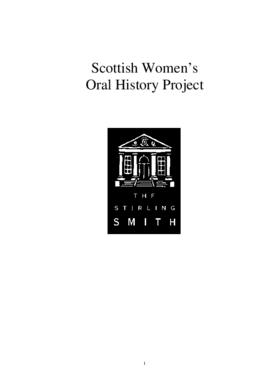Unidentified female interviewer in conversation with sports illustrator and social worker Jim Scullion of Coatbridge. The interview focuses on football, particularly the interviewee's support for Celtic Football Club.
- sound recording (0h 52m 48s)
Side A
[00:00:14] Introductions.
[00:00:47] Describes going to first football match; tells story of sneaking into Cliftonhill ground and being chased by police.
[00:02.21] Talks about who he went to games with.
[00:03:12] Talks about different areas of Celtic Park from which he watched games.
[00:03:47] Describes how he began to support Celtic as a child.
[00:05:03] Talks about family members’ support for Celtic.
[00:06:10] Talks about how he supported Celtic because his male relatives did; describes attending his first Celtic game; tells story of not realising it had started as there was no radio commentary by David Francey.
[00:07:18] Talks about how he now attends games with his children.
[00:07:26] Talks about female family members’ attitudes to football.
[00:08:12] Talks about whether it is acceptable for women to attend matches; describes bad language and behaviour at matches; remarks that he did not notice females attending when he was young, but saw families once he moved into the stand.
[00:10:29] Talks about facilities for men and women at football grounds in 1980s and 1990s.
[00:11:44] Talks about Celtic Football Club’s importance to him.
[00:12:38] Talks about the players’ importance to him.
[00:13:47] Describes his admiration for player Danny McGrain; mentions Kenny Dalglish and Billy McNeill.
[00:14:31] Talks about whether today’s players deserve high salaries.
[00:15:39] Mentions he is not a member of a supporters’ club.
[00:15:44] Describes when and why he became a season ticket holder.
[00:17:21] Talks about annual cost (season tickets, strips, videos) for himself and sons to support Celtic.
[00:18:04] Describes attitude to this cost.
[00:19:35] Talks about why he is not a Celtic shareholder.
[00:20:50] Describes pre- and post-match rituals when he was a child; tells story of arriving after kick-off because father and brother spent too long in pub; mentions getting Times and Citizen with pictures of players inside and being lifted over turnstile.
[00:22:34] Describes pre- and post-match rituals for himself and sons now; mentions difficulty of parking and exiting car park after matches.
[00:23:43] Talks about food eaten on match day.
[00:24:10] Talks about clothing worn to games; describes tradition of not entering ground until he sees someone he knows, otherwise team will lose.
[00:25:17] Talks about putting off family events to attend football and tells story of pregnant wife accompanying him to game when two weeks overdue.
[00:26:44] Describes atmosphere of Celtic Park when he was a child; mentions merchandise sold outside, including pictures of President Kennedy and (player) Johnny Thomson; describes supporters’ singing before, during and after match.
[00:27:50] Describes how atmosphere differs now; mentions that singing used to be deafening every week.
[00:29:37] Talks about routine of coming into ground with sons.
[00:29:51] Talks about team huddle being most special moment of the game, and final whistle the most hated moment.
[00:30:39] Detailed description of attending Celtic v. Albion Rovers at Cliftonhill, just after Celtic won European Cup in 1967; tells story of getting Lisbon Lions’ autographs and meeting Jock Stein and Jimmy Johnstone.
[00:33:39] Talks about how importance of supporting Celtic has increased for him over time.
[00:33:56] Talks about whether his support for Celtic causes arguments with friends, family and strangers.
[00:34:47] Describes how attending football with sons has enhanced his relationship with them.
[00:35:54] Describes attitude to fellow Celtic supporters; mentions his annoyance at abuse given to Rangers player, Dave McPherson.
[00:37:12] Remarks that he has friends who are Rangers supporters or ex-Rangers players.
[00:37:52] Talks about Celtic’s 1967 European Cup win; describes family events on that day, watching game on television and celebrations afterwards.
[00:40:03] Talks about Celtic’s 1979 league win on last day of season.
[00:40:38] Talks about Celtic’s 1985 league win at last game of season against St Mirren.
[00:41:37] Talks about winning domestic double in Celtic’s centenary year and mentions Roy Aitken.
[00:42:29] Talks about importance of winning 1997-1998 league cup and championship and preventing Rangers from winning 10 league championships in a row.
[00:43:41] Talks about a game in November 1998 when Celtic beat Rangers 5-1; mentions another game where Celtic beat Rangers 7-1.
[00:46:31] Talks about what he sees as Celtic’s greatest achievement.
[00:46:46] Recording ends.
Side B
[00:03:59] Interview resumes. Talks about it not really mattering if Celtic win or lose and how Albion Rovers fans are probably better football supporters.
[00:04:37] Describes his inability to support another club, even if Celtic were relegated.
[00:05:39] Sums up what Celtic means to him.
[00:06:15] Interview ends.

